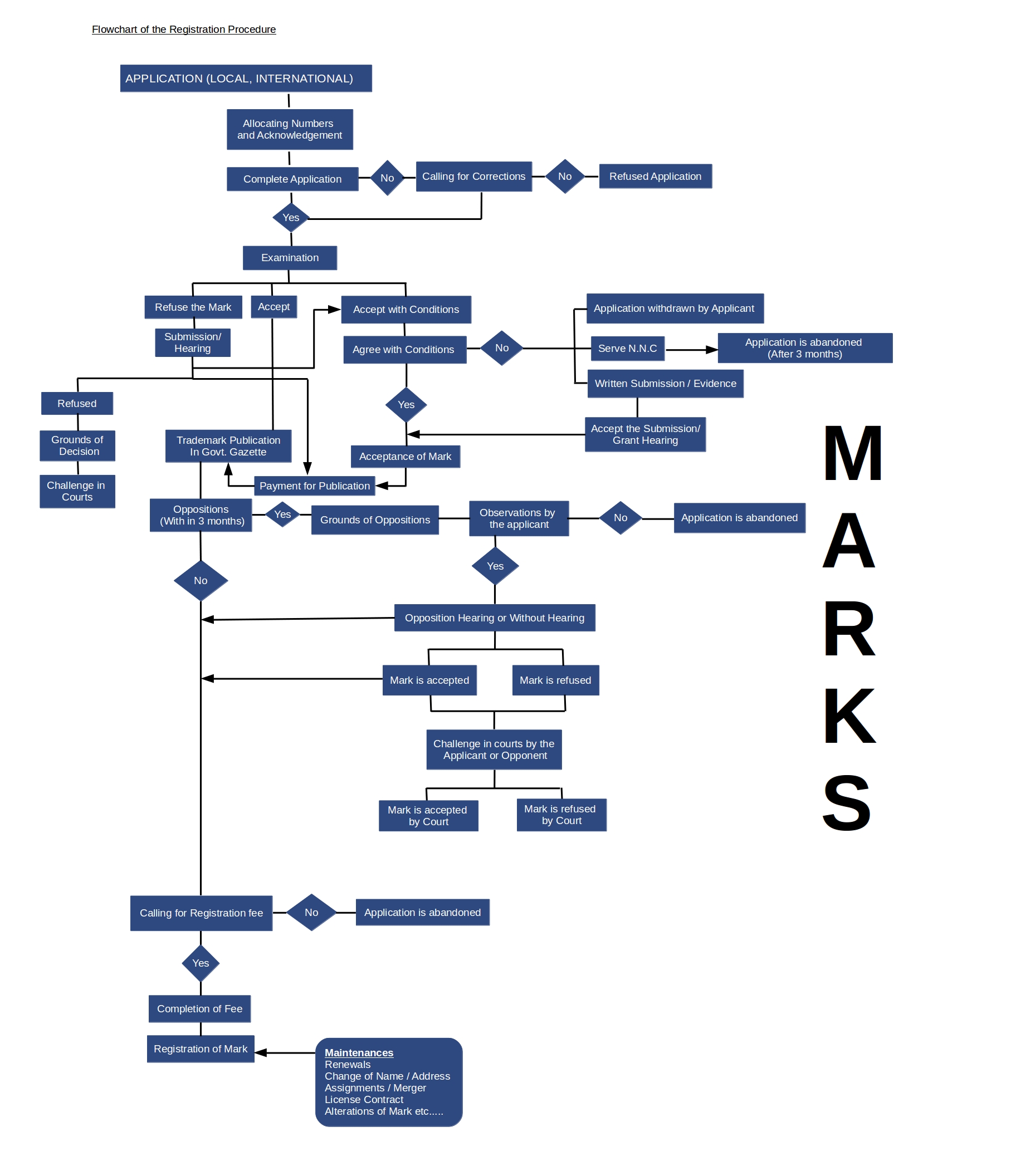What is a Mark?
A mark- trademark or service mark- is a visible sign that is capable of distinguishing the goods or services of different enterprises. A trademark relates to goods whereas a service mark relates to services. In addition, there are two more kind of marks – Certification marks and Collective marks. Certification mark is granted to the owner for goods or services if he certifies as to the origin, material and manufacturing method of goods or performance of service, quality and accuracy with regard to its use. A Collective mark is a mark serving to distinguish the origin or any other common characteristic of goods or services of different enterprises which use the Mark under the control of the registered owner.
What constitutes a mark?
A mark may consists of a word(s), a symbol(s), a device(s), letters, numerals, a name, surname or geographical name, a combination or arrangement of colors and shapes of goods or containers etc. A mark should be a visible and a distinctive sign and it should always be capable of distinguishing the goods or services of different enterprises.
Functions of a mark
It has several functions such as :
- distinguishes the goods or services of its owner from those of others
- indicates the source of the goods or services
- individualizes the goods or services of the owner
- enables the owner to reach the customers
- helps the consumers to make the choice in the market etc.
Registered and unregistered Marks
A mark which is registered at the National Intellectual Property Office under the law is considered as a registered mark. A mark can be used even without registration. Unregistered marks can be protected under the unfair competition law or common law action for passing off.
Why registered?
It is highly recommended to register a mark, as a trade or service mark. The registration of the mark gives its owner exclusive right to use, assign and license the mark. These rights can be easily enforced effectively through civil or criminal court procedure or both. Owner of the mark can restrain others from using his mark or a mark deceptively resembling his mark. Owner is even entitled to claim damages for violating his trade mark rights.
Registrable Marks
The marks which are not inadmissible under sections 103 and 104 of the Intellectual Property Act No: 36 of 2003 are registrable. A mark is inadmissible if it is descriptive of the goods or services concerned, if it is not capable of distinguishing the goods or services from those of others and if it is deceptively similar to the other registered or well-known marks.
How to register/ appeal?
Form M1 should be used to file an application. The processing of the application involves a number of work steps. The mark is examined to see whether it complies with formal requirements and whether it is not inadmissible under sections 103 and 104 of the Act. If the IP Office refuses it, applicant can make submissions against the decision or ask for a hearing within one month from the date of refusal. If it is still refused, the decision can be challenged in the Court (The Commercial High Court of Colombo).
A mark is first accepted for the publication in the Gazette. A period of 3 months is given to the public to file opposition after the publication. If there is any opposition, the IP Office will send the applicant a copy of same. Thereafter the applicant is required to forward observations against the grounds of opposition. IP Office will conduct an inquiry if necessary into the opposition with the participation of the applicant and the opponent. After the inquiry, the mark may get registered or refused. If it is refused applicant can challenge the decision in the Court. If it is accepted, the registration will be proceeded with upon the payment of the registration fee by the applicant. (Please refer to Part V of the Act and Regulations made under the Act.)
Who can register?
Any person or body of persons corporate and unincorporated. (individual (s), companies, partnerships, associations etc).
Period of validity and renewal
The registration is valid for a period of 10 years from the date of application and is renewable on the payment of the fee for further periods of 10 years. Please refer to the fee schedule published in the gazette which is available in the NIPO website.
Protection abroad
Marks registered in Sri Lanka are valid only in the territory of Sri Lanka. If the applicant does business in other countries, it is advisable to register the mark in those countries. Applications should be filed in each country in which the applicant seeks the protection under the respective national law. (Sri Lanka is not yet a member of the Madrid Protocol. When Sri Lanka becomes a member, an applicant may make one single application with one single fee calculated according to designations of countries by which his mark can be protected in over 114 member States. However, priority can be claimed under the Paris Convention for the protection of Industrial Property in its member countries. (within 6 months from the date of application in Sri Lanka).
Trade Names
A trade name is the name under which a person does its business – A person’s name, partnership name etc. Trade names can be protected under the IP Act. However, it can be registered as a mark only. Thus, it is advisable to register the trade name as a mark.







